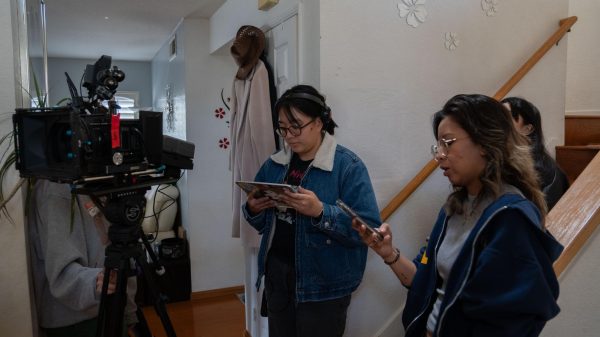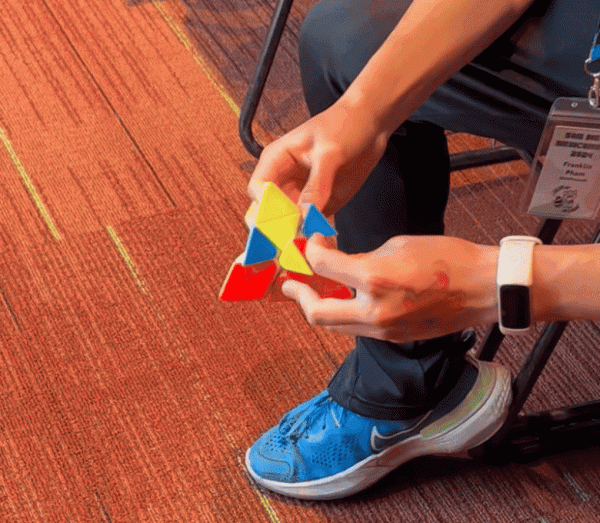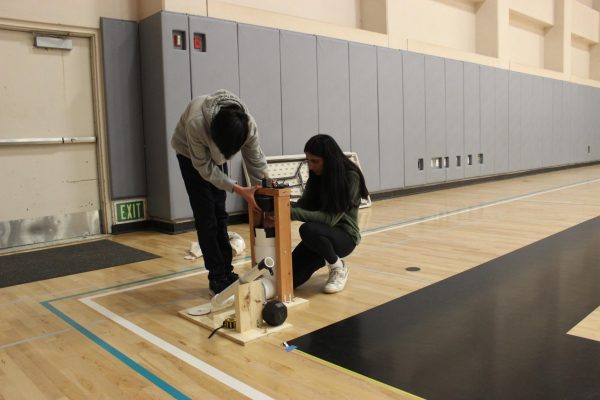Friday D&D sessions provides outlet for students’ imagination and creativity
October 10, 2017
Kakakyl, Evell, Lilith, and Vandrellen stumbled upon a watchtower last week.
The lights were dim. As they walked through a cobweb-infested hallway, they made out a set of stairs, stretching for what appeared to be miles. Beside them was a series of metal doors, seemingly untouched for thousands of years: each differing from the next, each containing a unique destiny.
As the four contemplated what to do, they were interrupted by the voice of their Dungeon Master, or the “God” of this world. However, this time he wasn’t speaking as the Dungeon Master: it was Nathan Chan (12).
“Alright, I’m gonna order pizza now, what do you guys want?” At this point, they had been playing Dungeons and Dragons for three hours.
The players laughed in response, transported back to reality. The world around them faded: They were no longer Kakakyl, Evell, Lilith and Vandrellen exploring a dark and eerie hallway, but Samuel Noel (12), Christian Pimentel (12), Amber Li (12) and Shiva Viswanathan (12). They were no longer casting spells and fighting with hooded figures, but ready to eat midway through their fantasy board game.
The game, which the group assembled to play together at the start of last summer, is a roleplaying action-fantasy board game known for its time-consuming nature and extensive rulebook.
After playing this campaign for a month, once a week for six hours each session in Noel’s house, the group is only halfway through their adventure.
“Some [campaigns] have lasted for years,” Viswanathan said. “There’s this one guy who has spent three or four years making a campaign with his friends.”
One look around the room, and it’s clear who the Dungeon Master is: Chan sits at the end of the table, his space on the table barely visible under the scattered legal pads and ripped pieces of notebook paper that detail the magic of this world. His world.
“My job is to take care of the world,” Chan said. “I’m giving them, ‘Here’s the world,’ and they do whatever [they] want with that world. They’re trying to create [the] story.”
The game involves a high level of imagination. Each of the players falls into their characters’ mindsets, picturing the fantasy world through the eyes of elves, demons, magicians – anything but the ordinary.
“Anything can go in any direction,” Viswanathan said. “You can betray each other, we can just have parties all day, we all die together. It’s this companionship that you wouldn’t get if you were playing [something] like Scrabble.”
Because of the roleplaying involved in the game, the stories created prove powerful. Once everyone is seated and the Dungeon Master speaks, the walls of the room disappear, as t-shirts become knight armor and wizard robes and textbooks sprawled on the floor transform into spellbooks.
“One day I’m a high school senior going through tests and depression about college apps, and the next moment I’m shooting halflings and trying to persuade other people not to kill me, and watching Amber’s [character] skin faces off people,” Viswanathan said.
According to him, players have the choice of whether or not to fully immerse themselves in their role, but when they allow themselves to disappear from reality, “everything just becomes more fun.”
The game plays a different role in Chan’s story, whose job as Dungeon Master (D.M.) requires more effort and quick thinking than the average player. However, it’s this critical thinking and freedom that makes this role so special to him.
“When I was a player, I was having a lot of fun creating moments, these stories,” Chan said. “But as D.M., it’s just so fun and interesting to see how the players interact with the world that I give them. It’s always the parts that are unexpected that are the most funny, the most iconic.”
For Chan, the game doesn’t act as a freedom from work; if anything, it adds to it, as he’s the only one who has to plan outside of their sessions. However, he said that the work becomes worth it when he sees the player-world dynamic that results from his work. He keeps a log of all the actions done by the players and rewards them based on “inspiration,” finding the most interesting moments to be those he anticipated the least.
“The special thing about D&D is you basically can do anything,” Chan said. “It’s not like a board game where you’re confined to certain rules. Really, it’s just about creating a story. You just want to sit down, have some snacks, have some soda, be at a table and just bond over this story that you finally create.”
After ordering the pizza, the five players settled back in their seats. Once again, the table seemed to disappear, the chairs transformed into medieval furniture, and the lamps turned into candlelight. And Lilith, whose turn came next, slowly opened the closest stairwell door, heart beating in fear.







